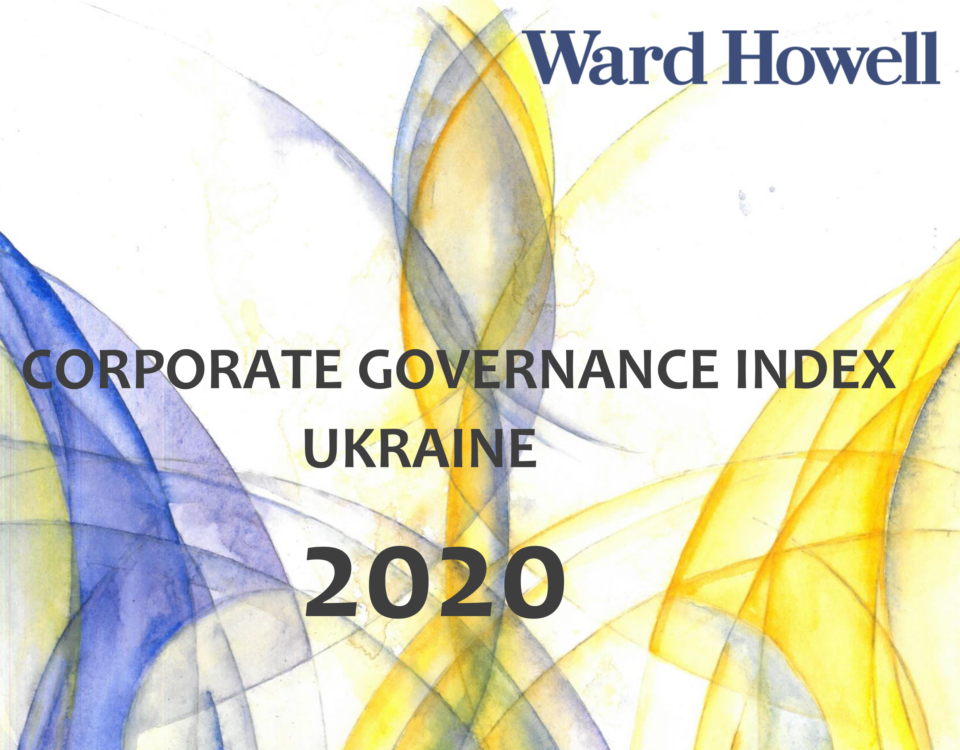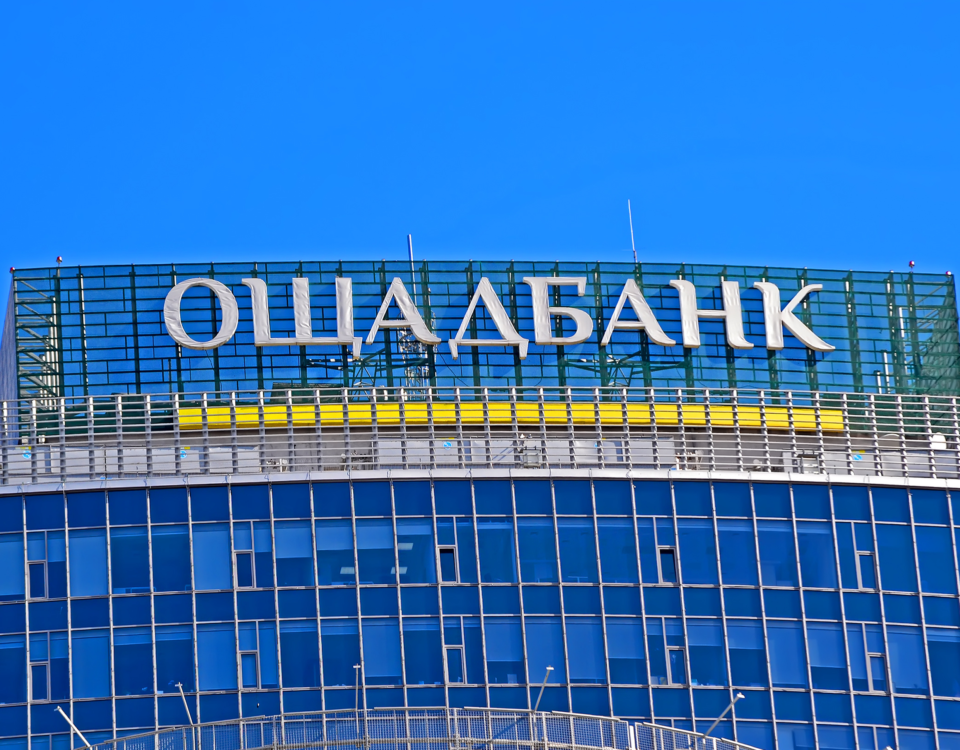
Als Führungskraft immer angstbefreit und unbezwingbar?
November 30, 2020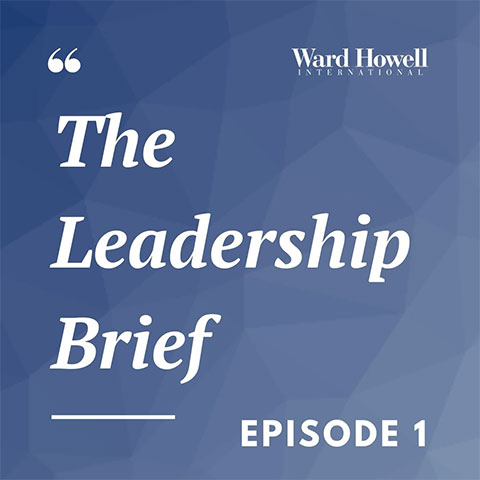
Podcast – The Leadership Brief #1
Februar 5, 2021
CORPORATE GOVERNANCE INDEX UKRAINE 2019
INTRODUCTION
This is the first edition of the Ward Howell Ukraine Corporate Governance Index, an annual study that examines the status of corporate governance in Ukraine.
Our purpose is to provide business leaders with a snapshot of current practices on Ukrainian boards, including board size and composition and the roles of the shareholder, the chairman, board committees, and the CEO.
We hope that you will find this research paper a valuable and practical source of ideas and insights. We welcome your feedback and the opportunity to discuss any of the issues that arise from our research.
METHODOLOGY
WHU-50
WHU-50 is an annual list compiled by Ward Howell Ukraine that shows the leading Ukrainian companies in terms of corporate governance development. The list includes the following groups of companies, for which information about corporate governance systems is usually publicly available:
The list of these companies can be found on page 22.
Fifteen companies on the WHU-50 meet two or more of the above target criteria. To assure the greatest possible accuracy of the data, the following definitions should be taken into account when analyzing the results of the research:
Unlike the well-known indices of stock exchanges and business magazines, which are strictly rule-based, the components of WHU-50 Index have been selected by Ward Howell. When choosing the list of companies, Ward Howell assesses the company's merit using several primary criteria: availability of information, progress made in improving corporate governance, and impact on the economy. This index does not include some private Ukrainian companies with well-developed advisory boards.
The list is not static. In the future, new companies can be added while companies currently on the list can be deleted.
Data sources and definitions
We gathered all the publicly available data from the 50 companies’ websites and official documents, including but not limited to:
All data were taken as of December 31, 2019. In the few cases when such information was not found in the documents listed above, the data were taken from the most recent and relevant documents. The list of systemically important banks was taken as of March 5, 2020.
Our research focuses mostly on gathering numerical data and constructing statistical models to reveal the patterns of corporate governance in Ukraine.
A company’s country allocation in the WHU-50 is based on initial incorporation along with market perception. We define international companies as those in which foreign citizens hold the majority of shares. We define foreign professionals as being of different nationality from Ukrainian. New members of the board are those who were appointed for the first time in the 2019.
Under “board” we mean either supervisory board as in a two-tier system or board of directors as in a one-tier system. The management board is identified as such.
List of abbreviations
FSE - Foreign Stock Exchanges
SOE - State-Owned Enterprise
SOB - State-Owned Bank
USE - Ukrainian Stock Exchanges
Q1 - Lower quartile – the point at which one fourth of the data are less than or equal to that point.
Q3 - Upper quartile – the point at which one fourth of the data are larger or equal to that point.
Min - Smallest number among the research subjects
Max - Largest number among the research subjects
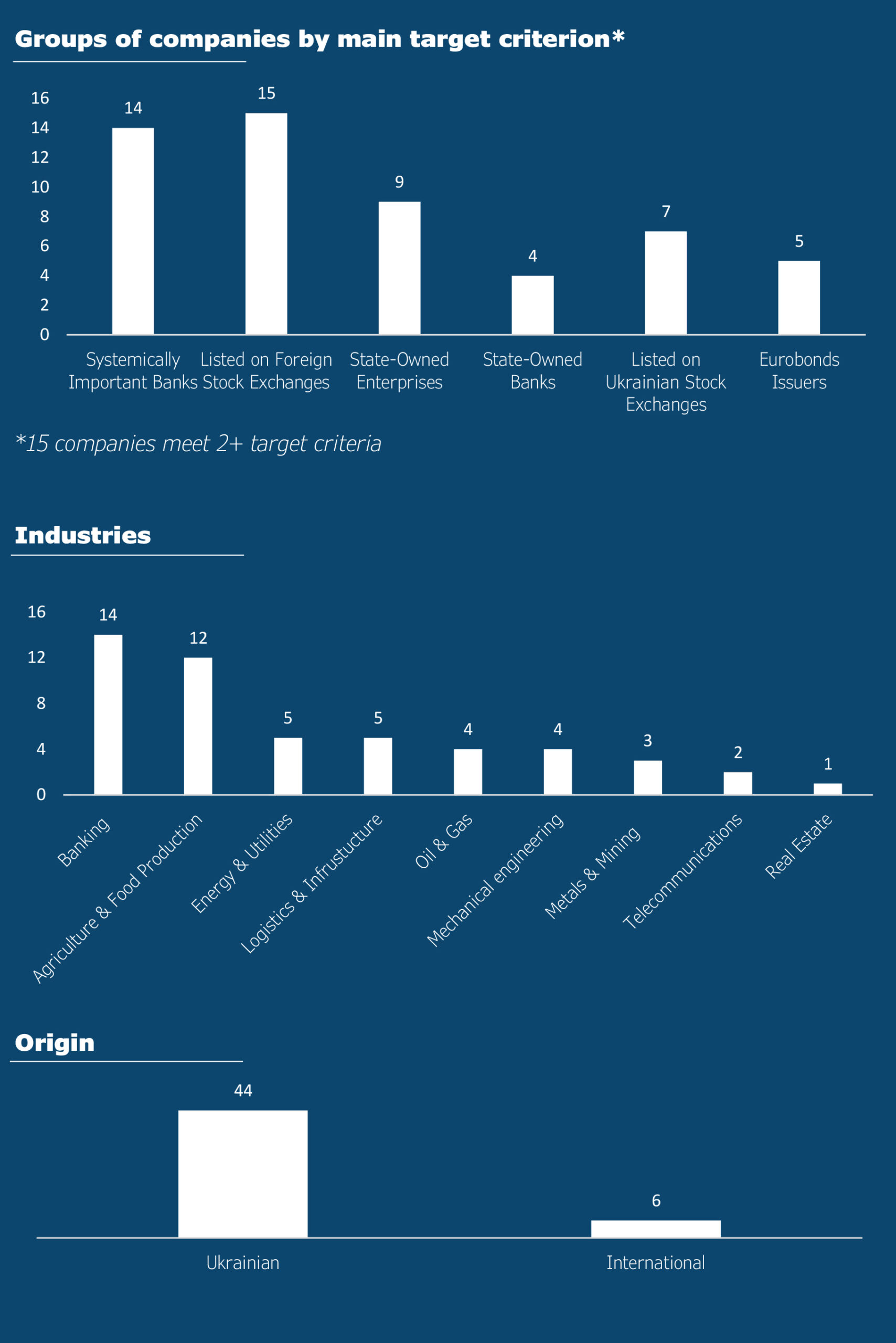
RESULTS
Board Size
The average board size across the WHU-50 is 6.5 board members, including both independent directors and shareholder representatives. Board size ranges from 3 to 11 board members.
Banks have the largest boards while the smallest boards tend to be found in the companies listed on foreign stock exchanges. All the banks except one among the WHU-50 have 5 or more members of the board. In each of the target groups, the maximum number of the board members can reach as high as 7-11 members. At the same time, in each group there are companies that operate with 3-5 members of the board.
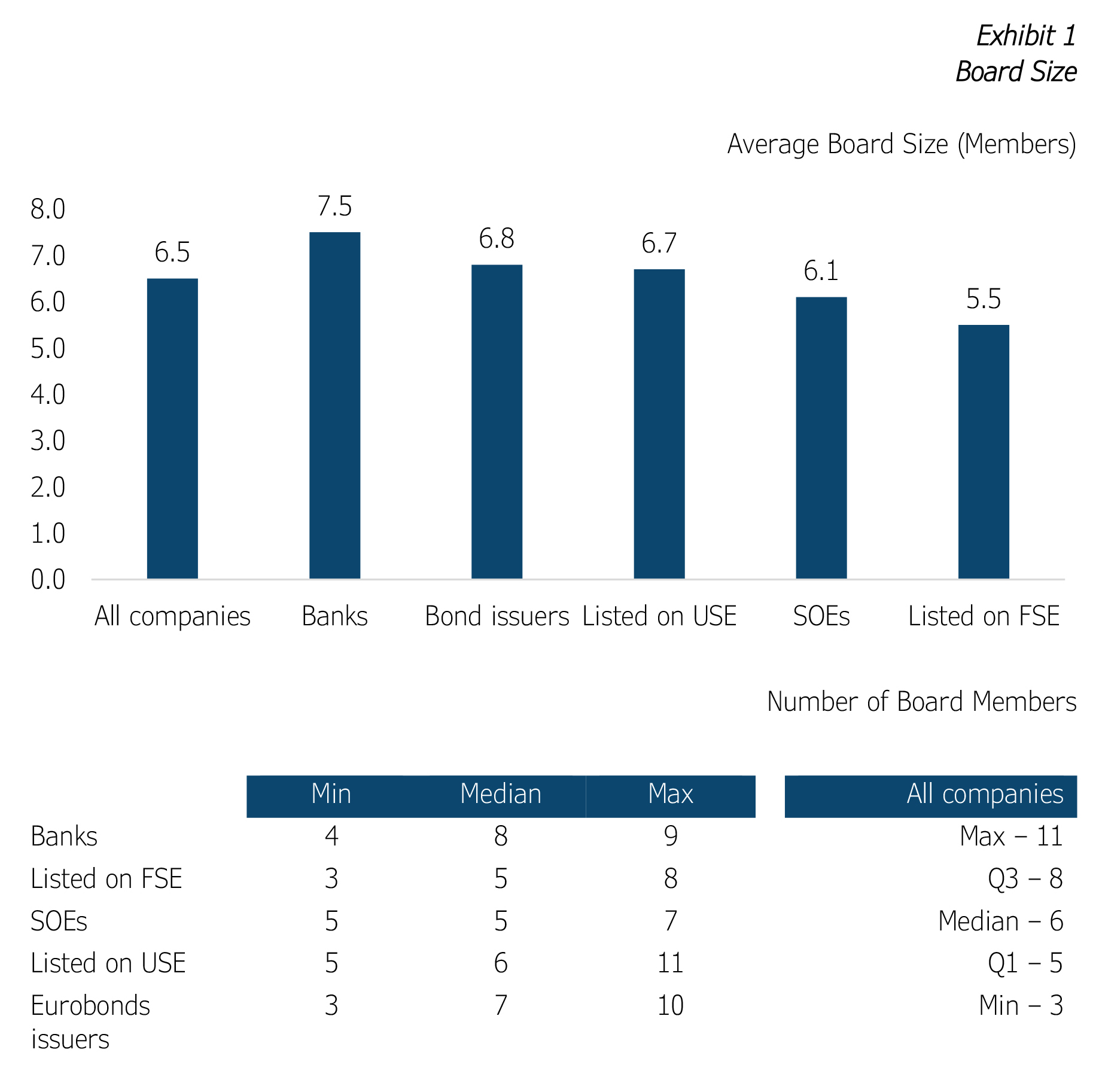
One-Tier vs. Two-Tier Boards
Two types of board structures are prevalent: the one-tier board (also called a unitary board) and the two-tier board (also called a dual board). Ukraine has adopted a two-tier board structure: Ukrainian joint stock companies usually have a supervisory board and a management board. However, companies listed on foreign stock exchanges usually have one-tier boards in accordance with local exchange regulations. Among the WHU-50 companies, 32 (64%) have two-tier boards and 18 (36%) have one-tier boards. All banks and other state-owned enterprises have two-tier boards while all companies listed on foreign stock exchanges have one-tier boards. Companies listed on the Ukrainian stock exchanges and Eurobond issuers have a mix of one-tier and two-tier boards.
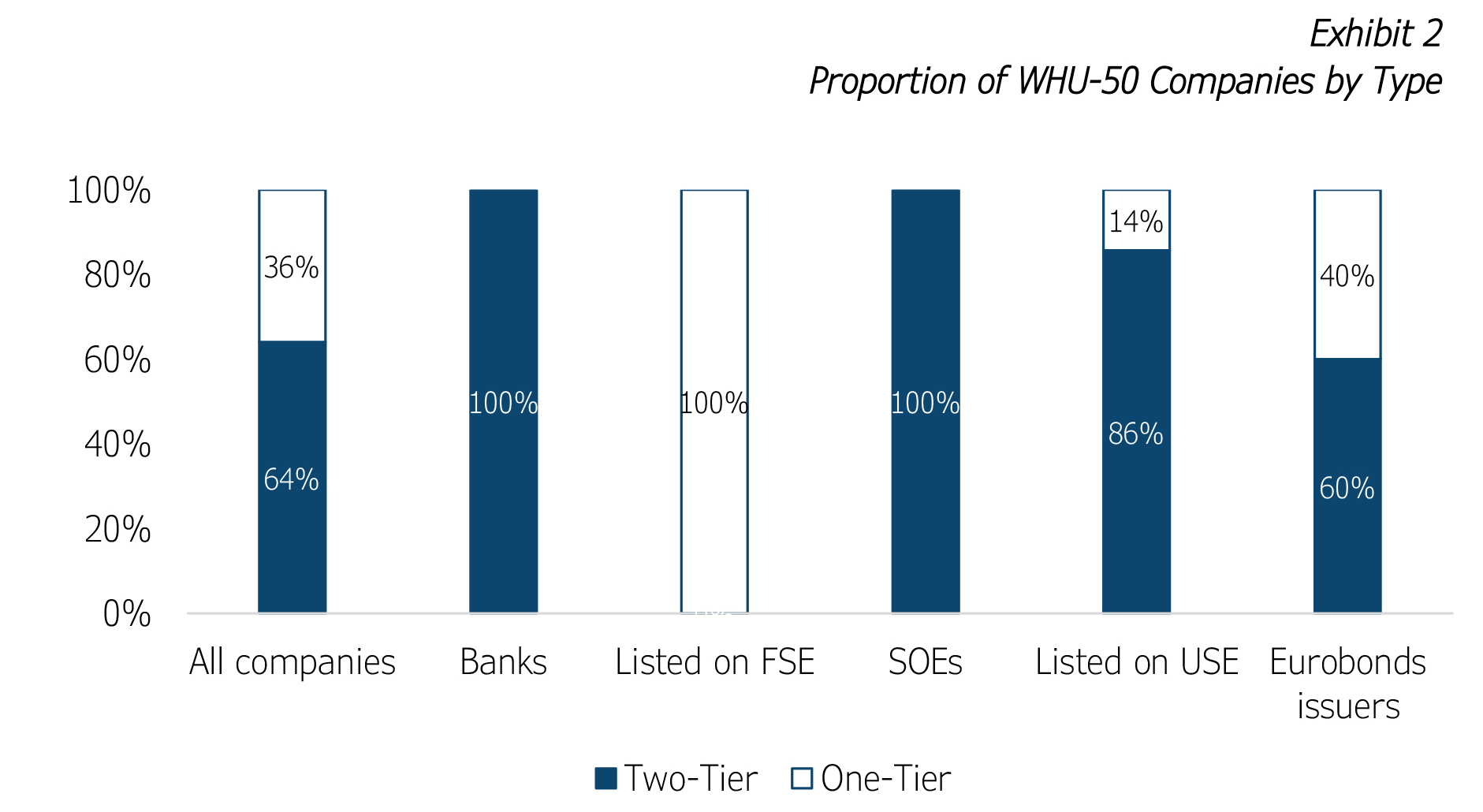
In the case of a one-tier board, the Chairman of the board and the Chief Executive Officer can sit on the single board. In the two-tier board system, the supervisory board is led by the Chairman of the board and the management board is led by the CEO of the company.
The average size of the two-tier boards in the WHU-50 is 6.9 while one-tier boards average 5.7 members.

Independent Directors
Among all 323 board members of the WHU-50, 143 members are independent (44.3%) and 180 are either shareholders or their representatives (55.7%).
For companies listed on Ukrainian stock exchanges and Eurobond issuers, the average percentage of independent directors is significantly lower, at 29.8% and 23.5%. The highest percentage of independent members is at state-owned banks (67.6%) and other state-owned enterprises (67.3%). Four companies have no independent board members and 21 companies have less than 3 independent members on their boards, thereby averaging 24% of the total independent members of the board. To compare state-owned banks and private banks of the WHU-50, the percentage of independent board members is 67.6% and 43% respectively.
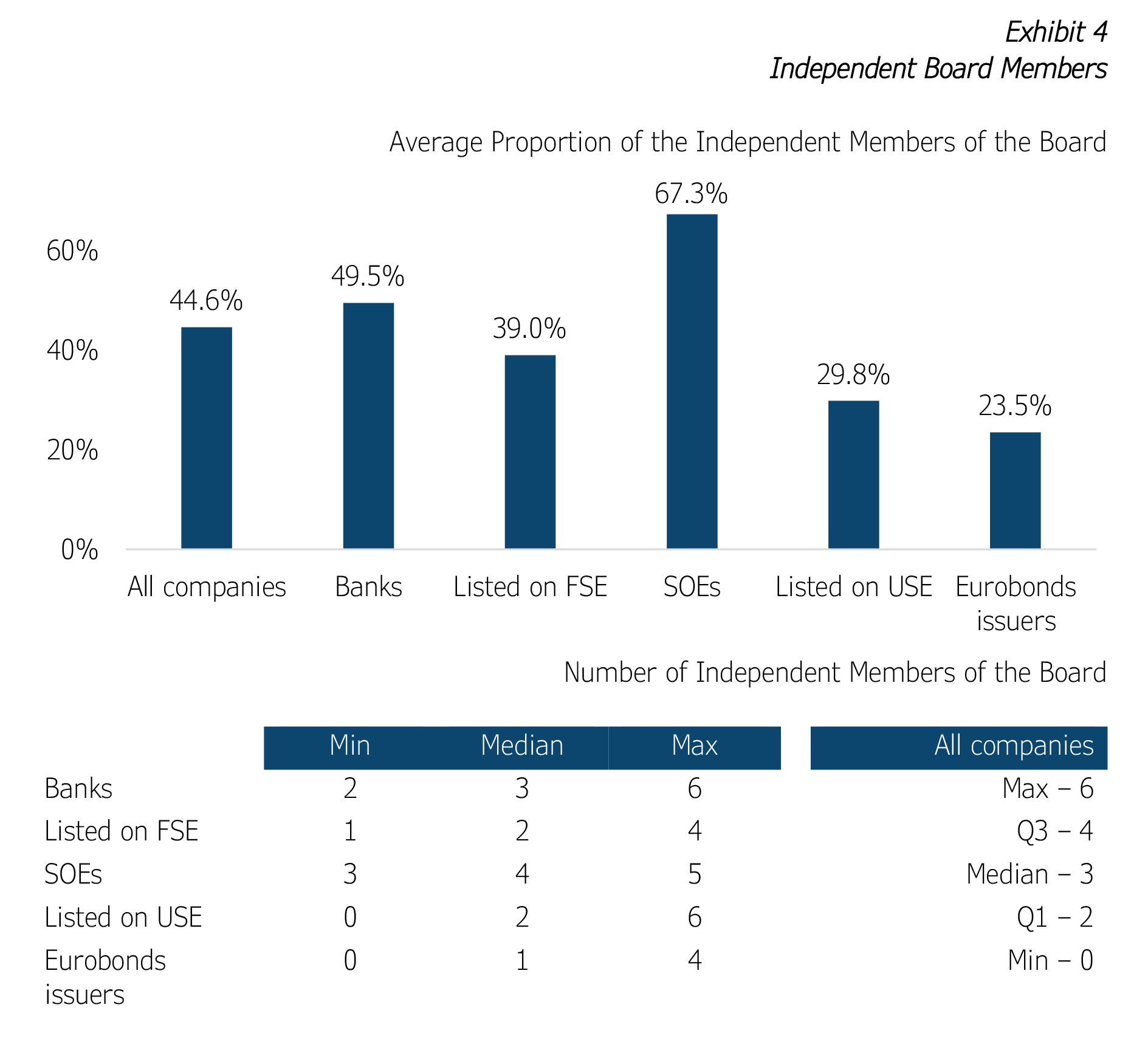
Foreign Professionals on the Board
The total number of foreign professionals on WHU-50 boards is 143 members, or 44.3% of the total amount. The foreign professionals are either independent board members or representatives of the shareholder. The most common examples of foreign professionals as representatives of the shareholder are private international banks in Ukraine where headquarters executives sit on the boards of the local legal entities. The largest number of foreign professionals on WHU-50 company boards is 8 and reaches as high as 90-100% in 3 companies of the WHU-50. But none of the companies that are listed only on the Ukrainian stock exchanges has foreign board members.
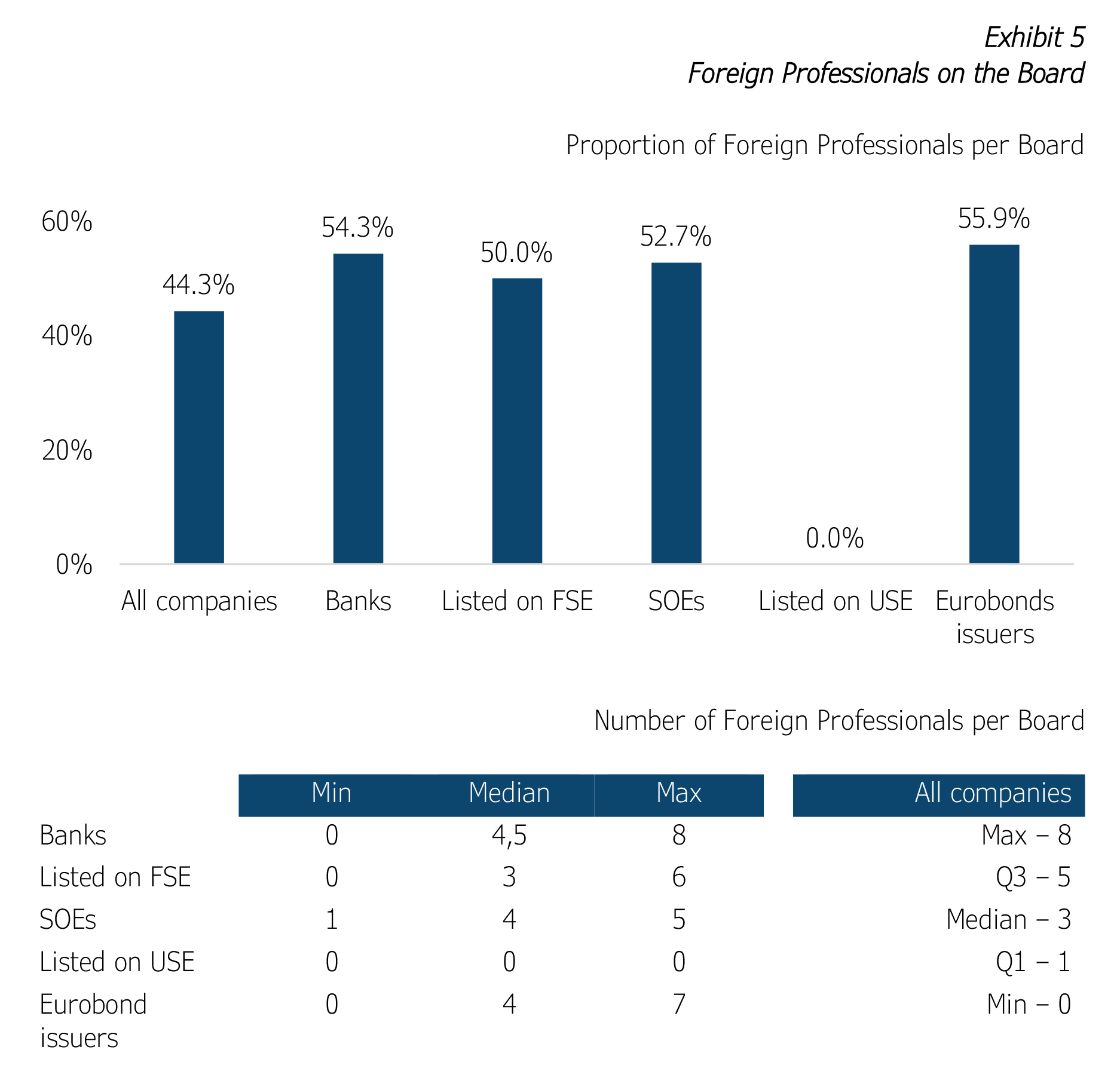
Women on the Board
The issue of diversity and particularly female representation on the boards is increasingly important today. When all WHU-50 companies are taken together, female representation on the boards totals 57 women or only 17.6%. At some companies, more specifically banks and state-owned enterprises, the number of women on the board can reach as high as 4 out of 9 seats, or 44%. Overall, the percentage of women on the supervisory boards of state-owned banks is 23.5% while at the private banks it is 21.2%. Each of the four Ukrainian state-owned banks has at least one woman on the supervisory board. Seventeen companies in the WHU-50 list, 34% of our sample, have no female representation on the supervisory board. The lowest percentage of female representation on the board is at companies listed on the foreign stock exchanges.
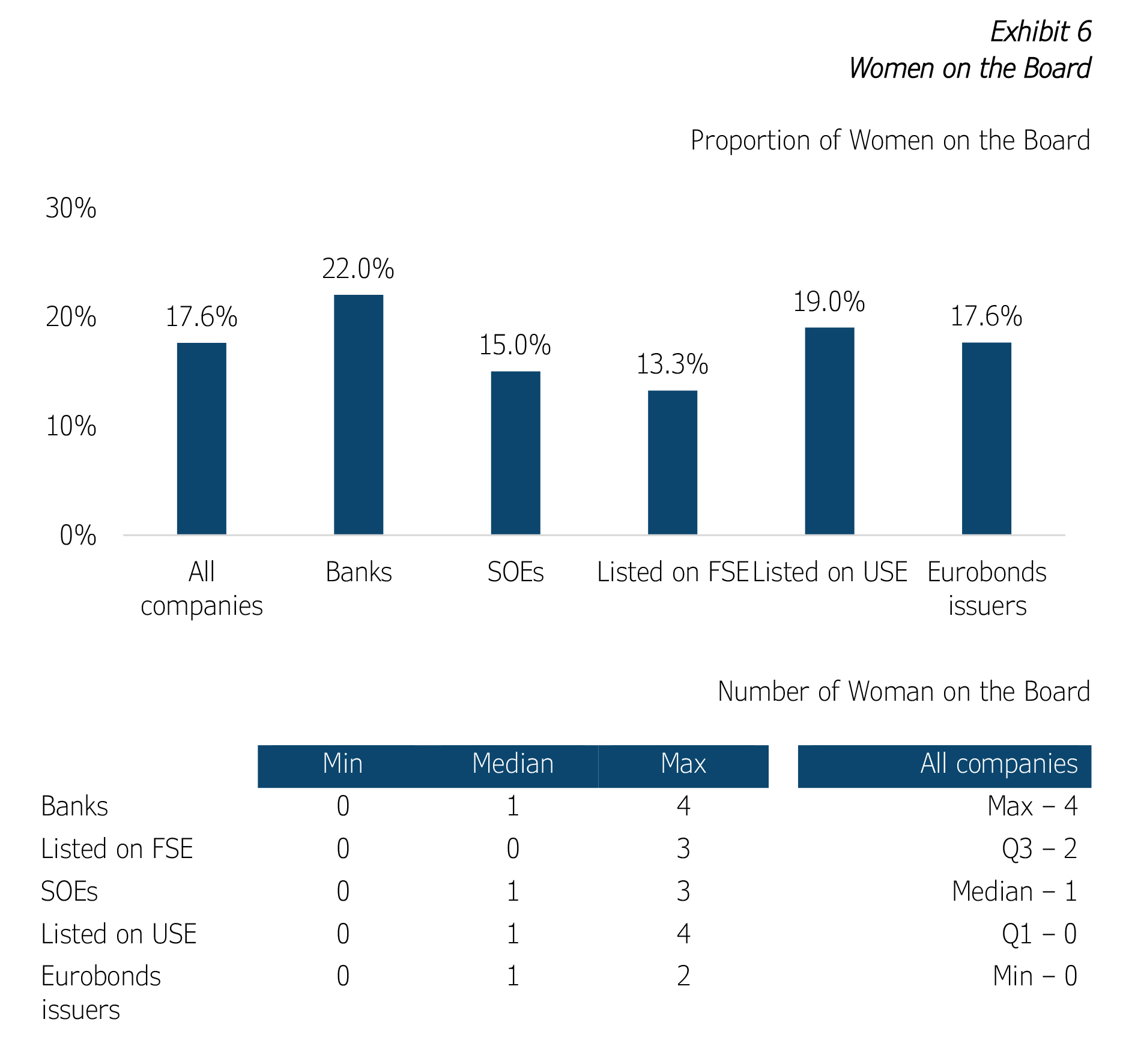
Chairman
The chairman of the board in 36% of the WHU-50 companies is an independent board member, in 48% a hired representative of shareholder, and in 16% a founder of the company. In total, there are 8 chairmen of the board who are the founders of the business. This situation is typical for Ukrainian companies listed on foreign stock exchanges. Independent chairmen of the board tend to be present in state-owned banks and other state-owned enterprises. At private banks and at companies listed on foreign and Ukrainian stock exchanges, the chairmen are representatives of the shareholders.
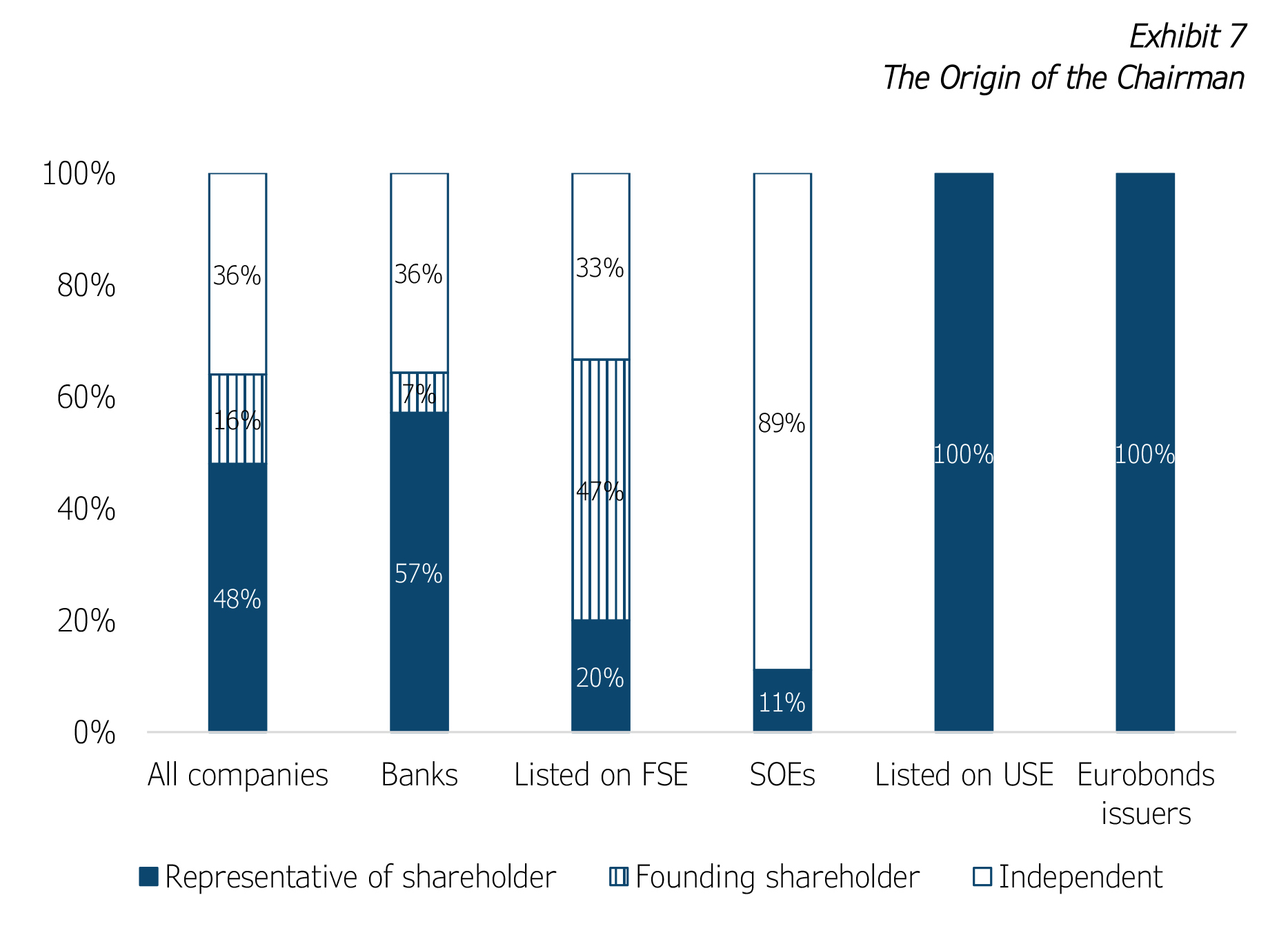
There are four chairmen of the board who are seated on more than one WHU-50 board simultaneously. Two of them are CEOs of the holding companies of financial and industrial groups, the third is the main shareholder and a founder of the business, and the last is the independent chairman of the supervisory boards of two large state-owned enterprises.
In 78% of cases, the independent chairmen do not have previous board experience. Their professional backgrounds are typically either hands-on industry experience, especially at banks and oil and gas companies, or legal and investment experience.
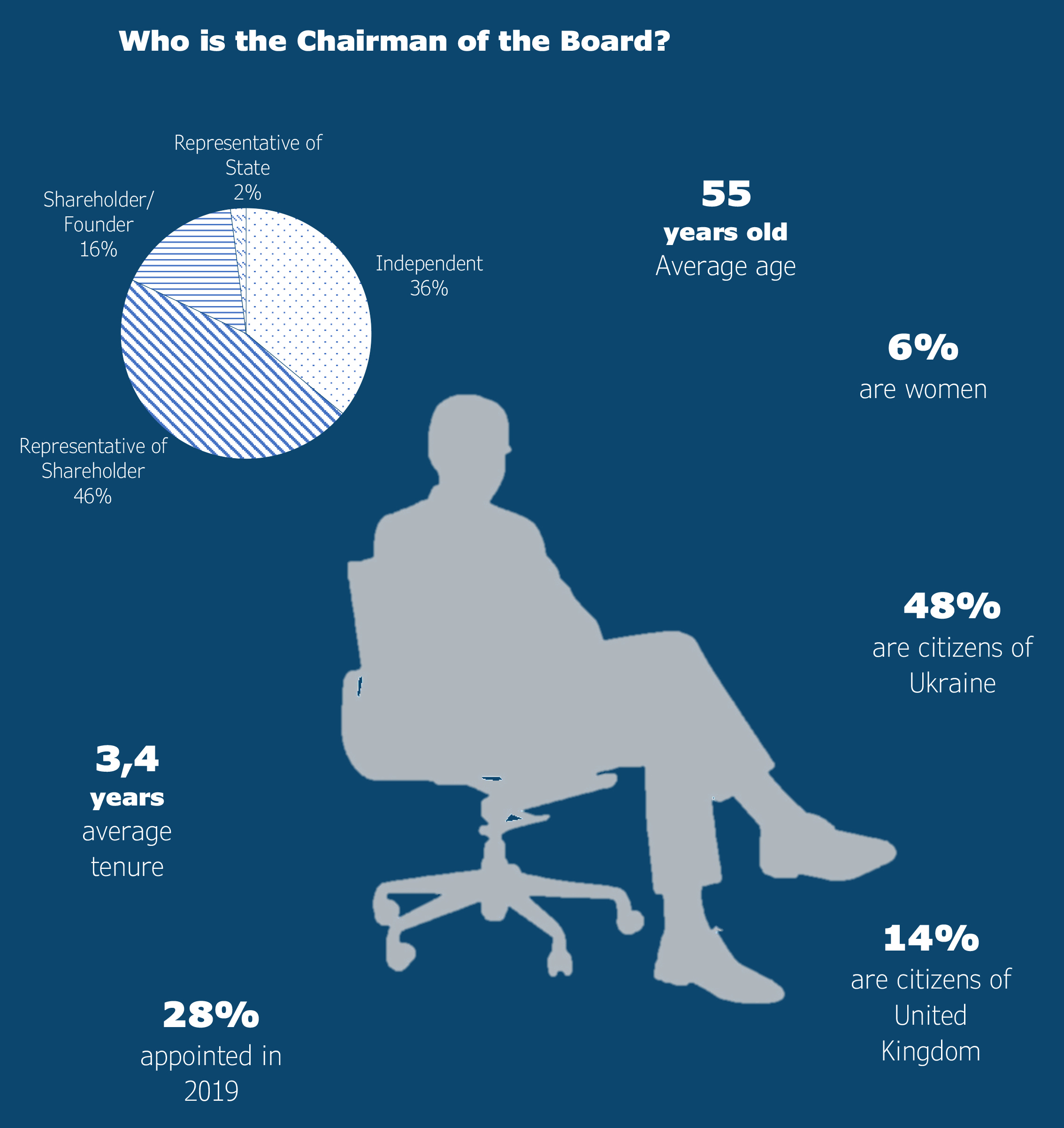
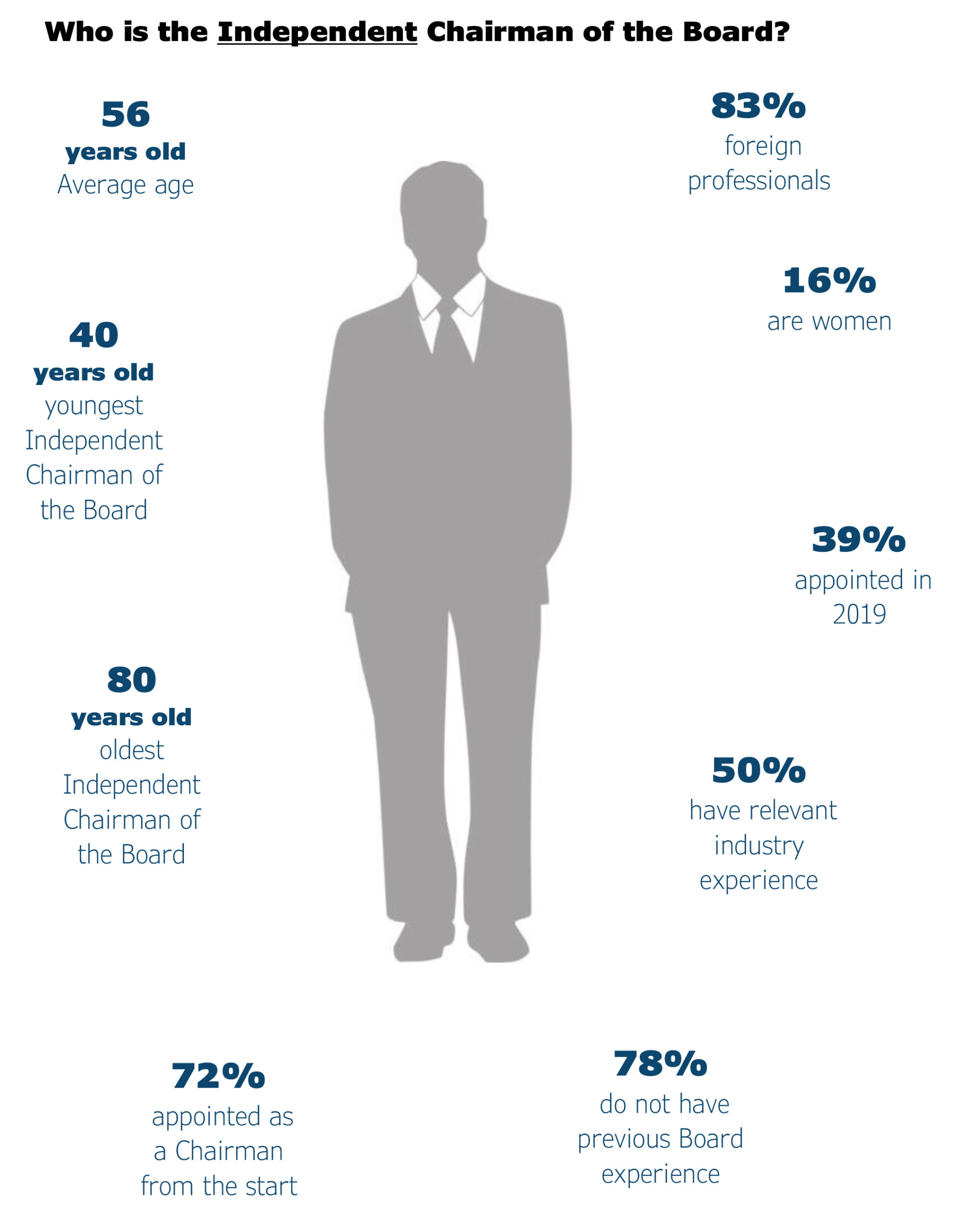
New Members on the Board
In 2019, 104 new board members were hired, a total of 32.5% of all board members in WHU-50 companies. A large number of the new appointments resulted from the reform in the state-owned sector in Ukraine. A major restructuring of the supervisory boards was carried out at 3 out of 4 state-owned banks as well as at several state-owned enterprises where the first independent supervisory boards were established. Among the 104 newly appointed board members, 55 are independent and 49 are representatives of the shareholders. The largest number of independent board members were appointed to the boards of state-owned banks and other state-owned enterprises.
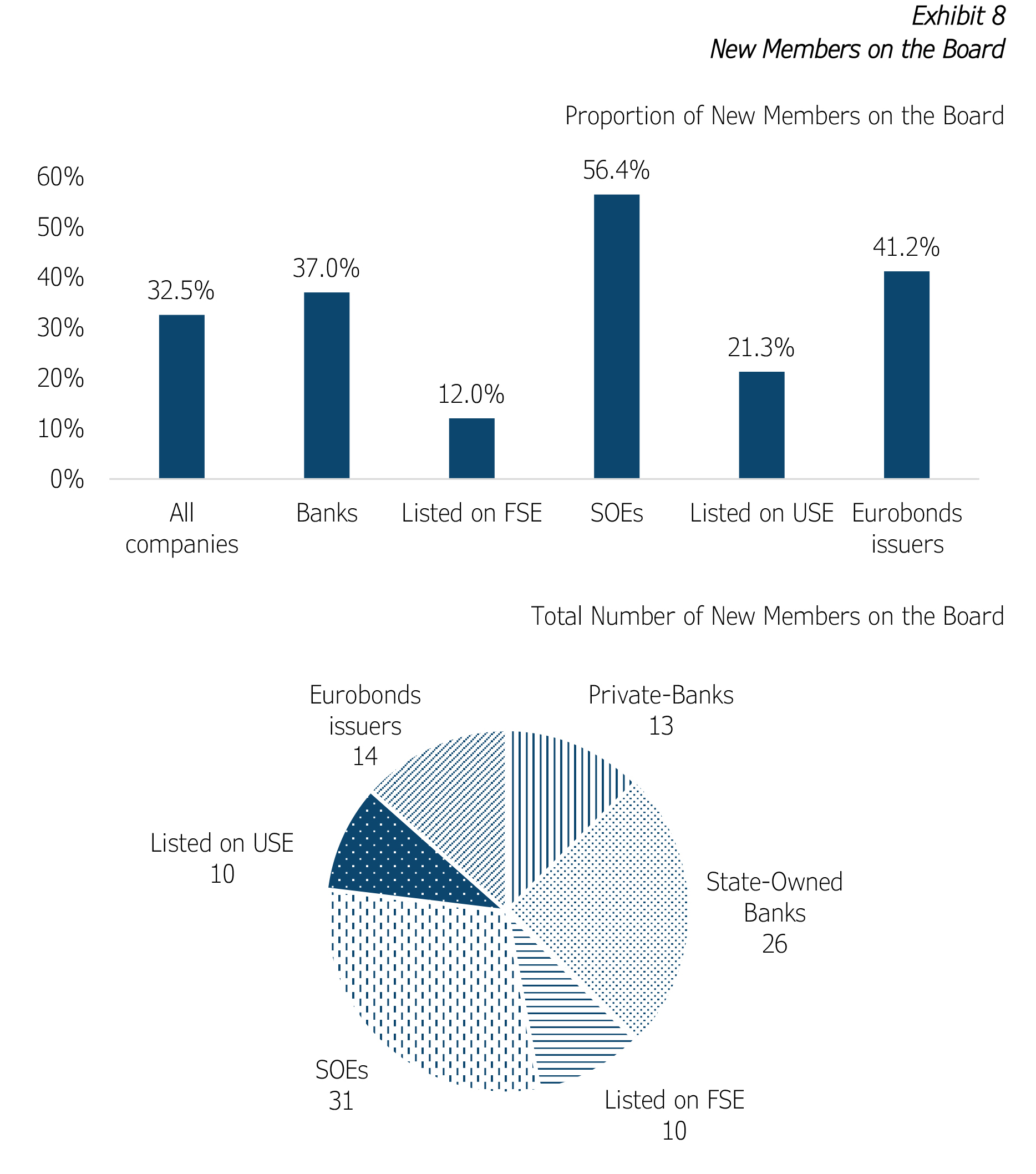
Board Committees
Among the WHU-50 companies, 6 have not set up any committees. Audit and nomination & remuneration committees are the most common. Forty-three companies of WHU-50 have audit committees while 29 have nomination & remuneration committees. In addition, 7 of WHU-50 companies have only a remuneration committee and 3 of WHU-50 companies have a separate nomination committee and remuneration committee. A risk committee is present at 10 of the WHU-50 companies while strategy-related committees are present at 9 of the WHU-50 companies. Other committees may be necessary for organizations in specific industries. For example, some WHU-50 Metals & Mining as well as Oil & Energy companies have a Health, Safety and Environment (HSE) committee, and some WHU-50 banks have an IT and Digital Transformation committee.
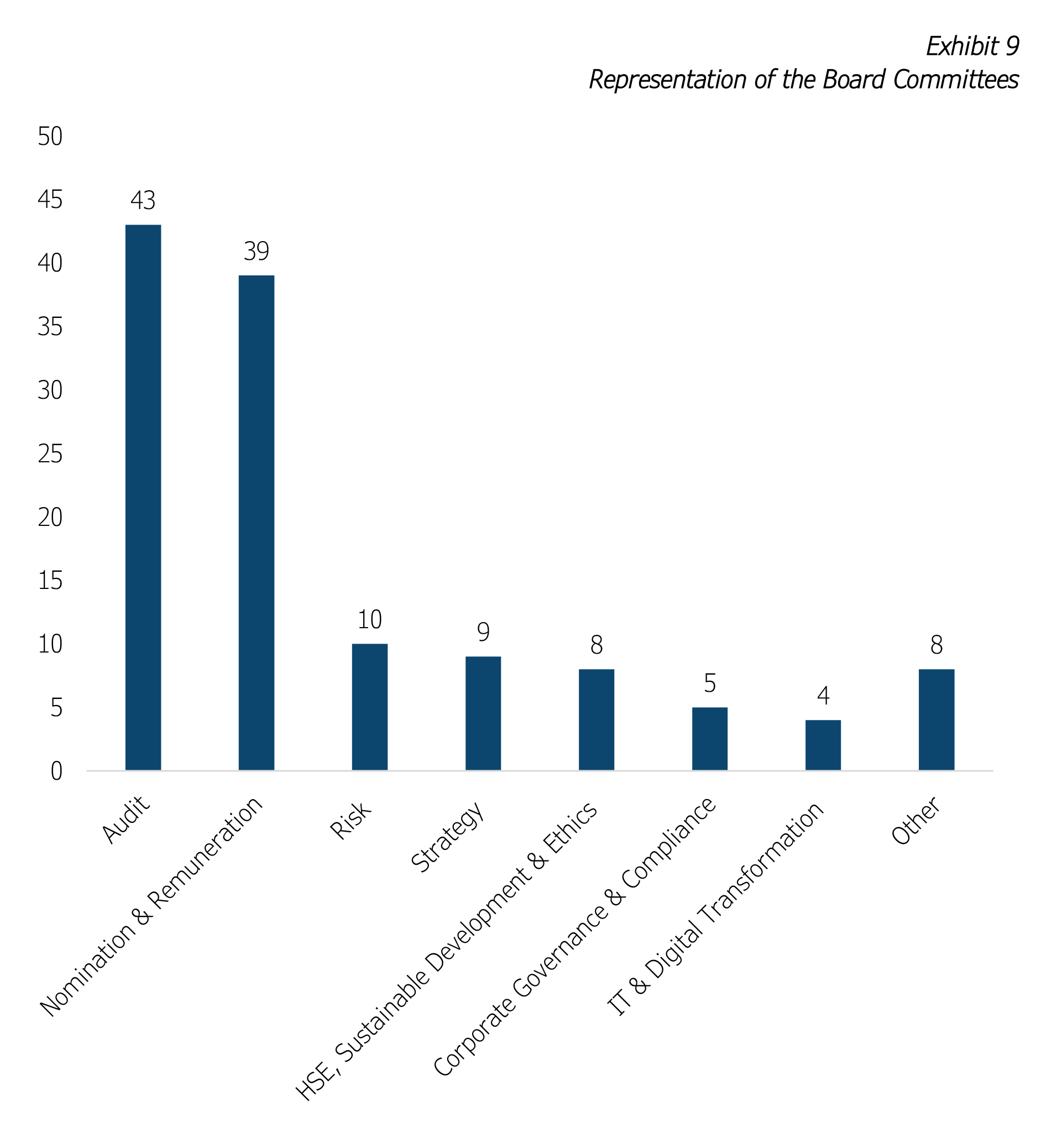
All WHU-50 companies have in total 129 committees with the average of 2.6 committees per board. The largest number of committees is 8. Sixteen WHU-50 companies have 2 committees established. State-owned enterprises as well as banks have the largest number of board committees.
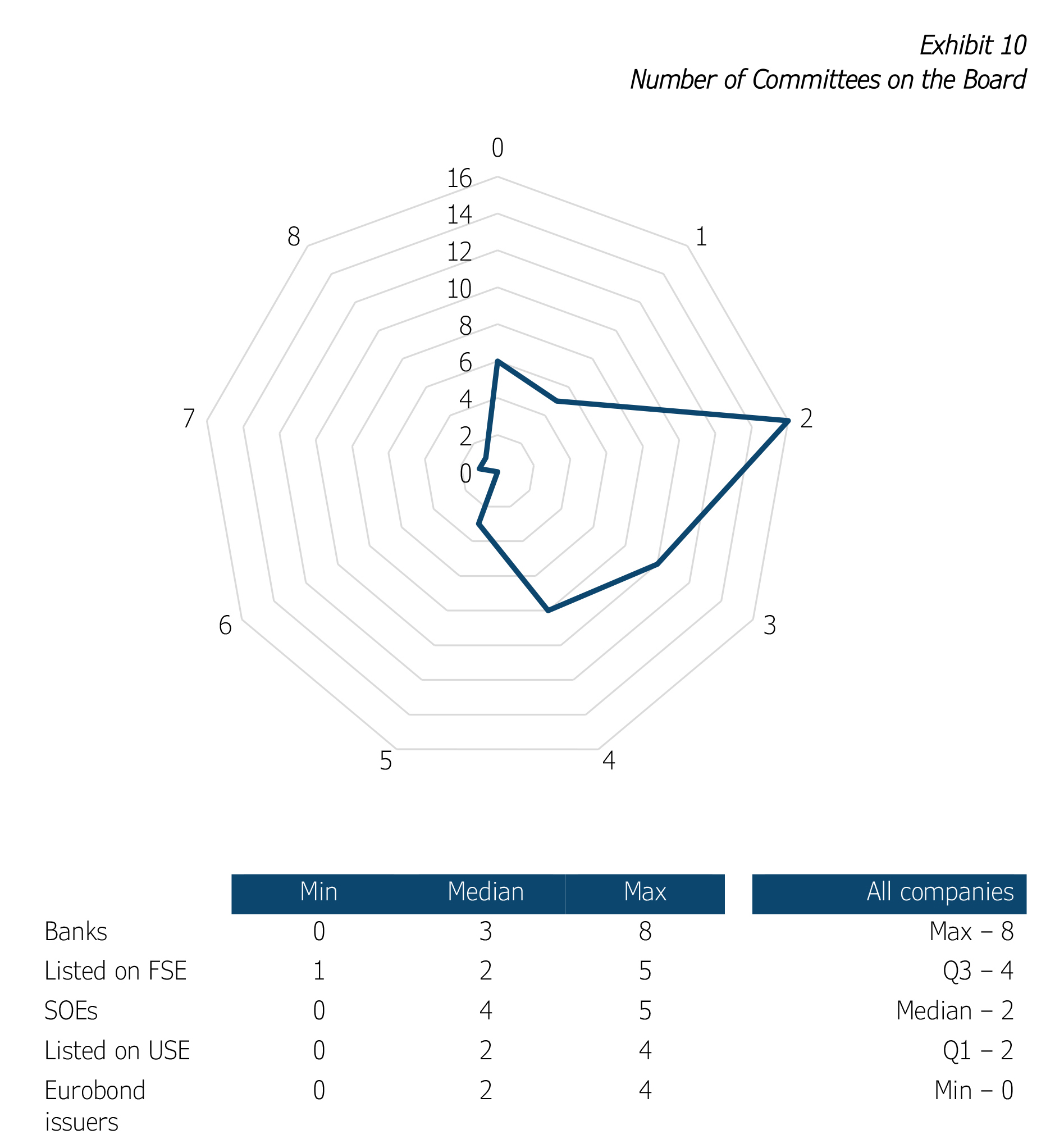
Board Meetings
Not all the WHU-50 companies provide information about their board meetings. Based on the available information from 33 companies, the greatest number of meetings held in 2019 was 126, a significant outlier. The smallest number of meetings was 2. The average amount of meetings was 25 and the median was 17.
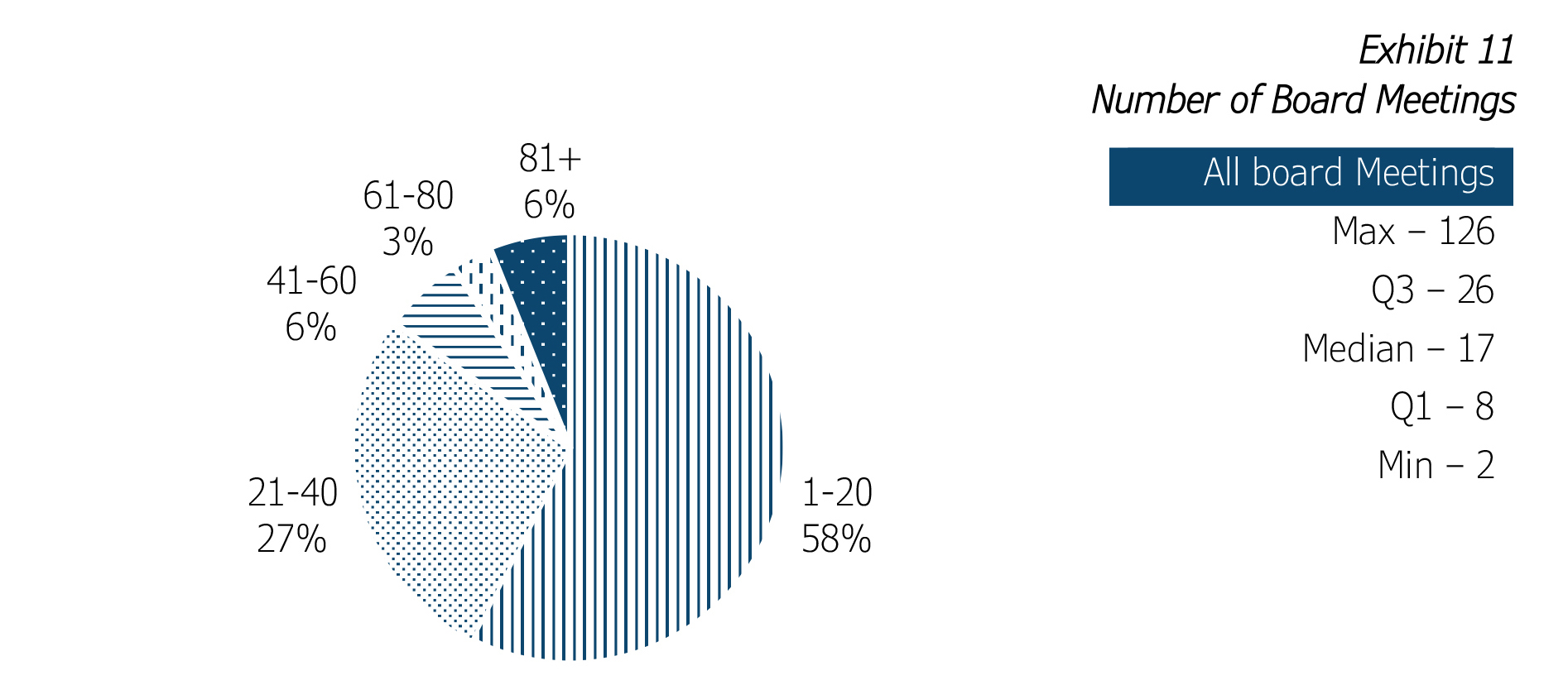
Based on the available information from 26 companies, the average number of meetings of the audit committee was 8. Based on the available information from 21 companies, the average number of meetings of the nomination & remuneration committee was 11.
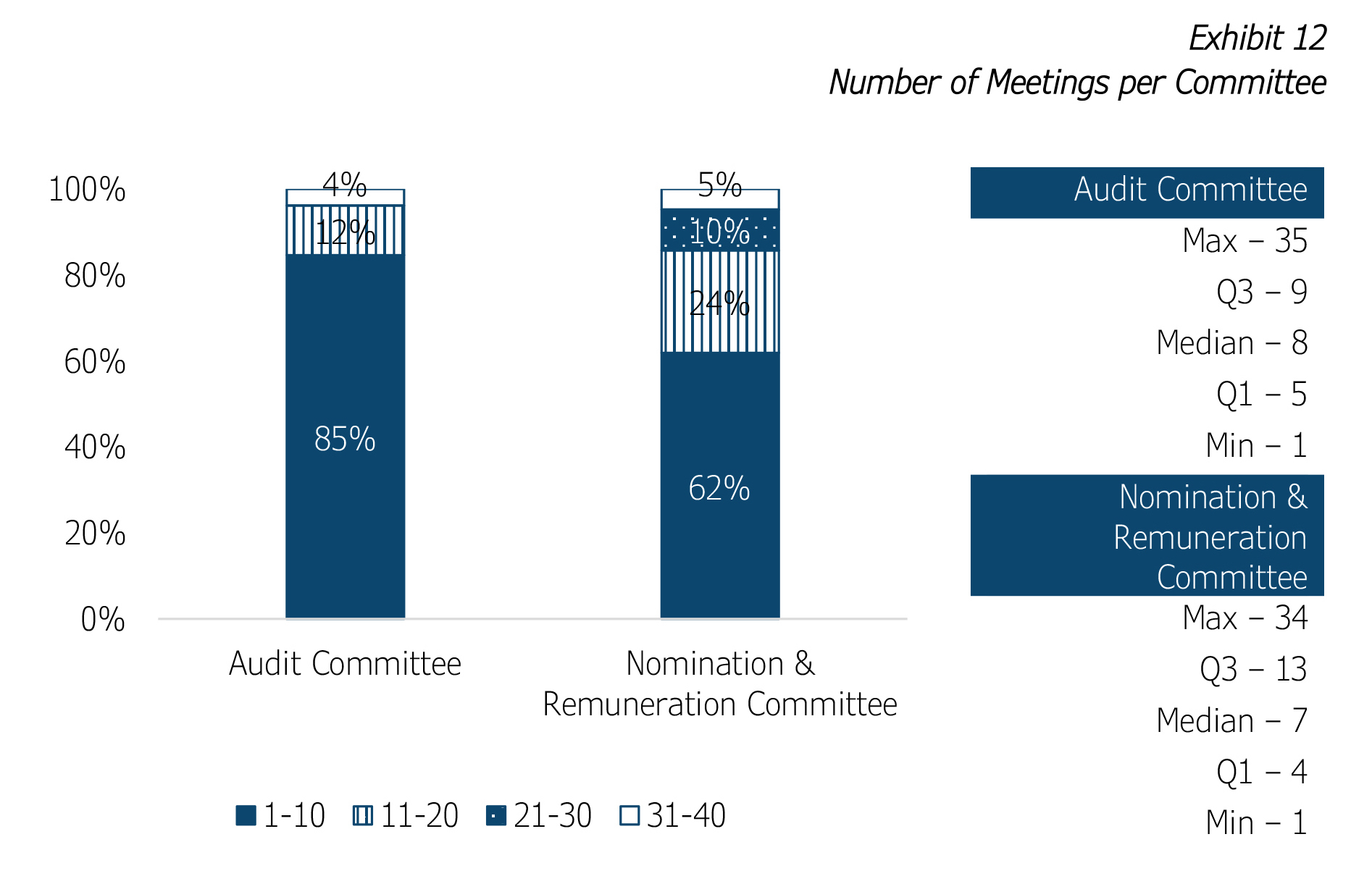
Chief Executive Officer
The role of the CEO is of equal importance on one-tier and on two-tier boards. Therefore, it is important to explore all aspects of CEO origin at the WHU-50 companies.
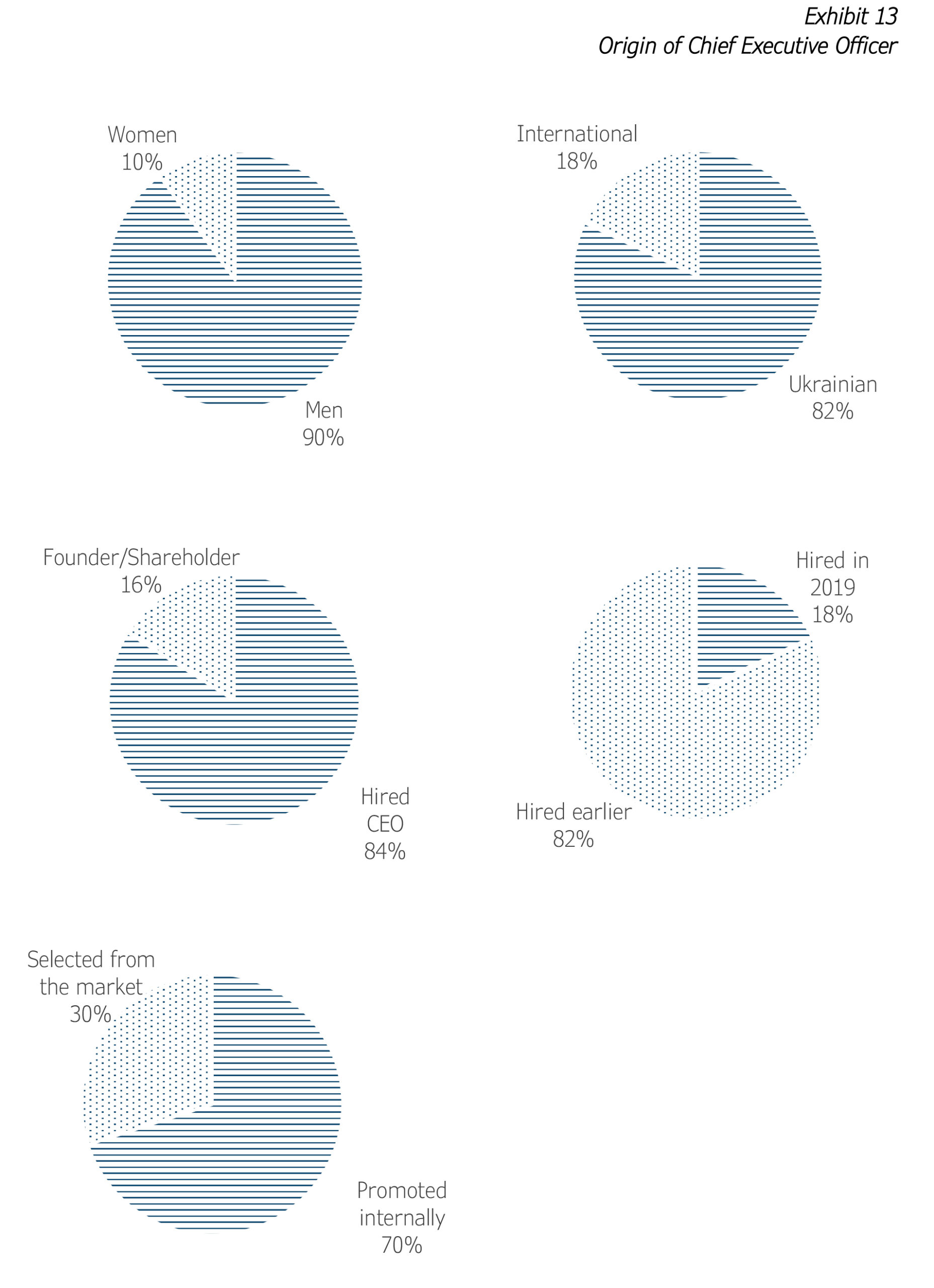
During 2019, 9 new CEOs of WHU-50 companies were appointed. In 90% of the cases, the CEO is male. In 82% of the cases, the CEO is Ukrainian and in 18% a foreign professional. 16% of CEO seats belong to founders and shareholders of the business, and 84% of seats belong to hired CEOs.
Among the hired CEOs, 70% were promoted internally while 30% where selected from the market. Among the 9 new appointments of 2019, 7 (78%) were promoted internally and 2 (22%) were selected from the market.
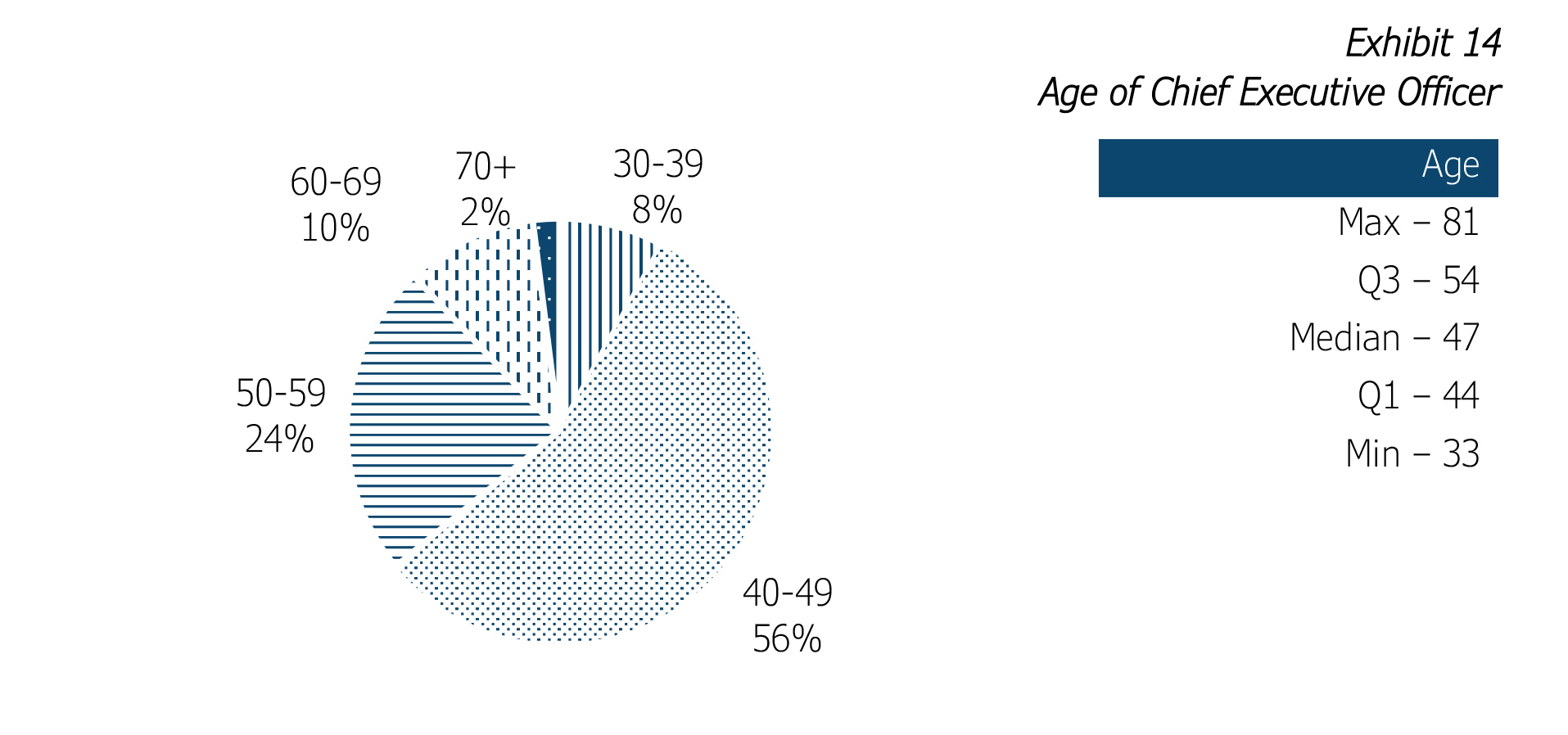
The average age of the CEO is 49 years old while lowest age is 33 and the highest 81. In our sample, 4 CEOs are under 40 years old and 6 CEOs are 60 years old or older.
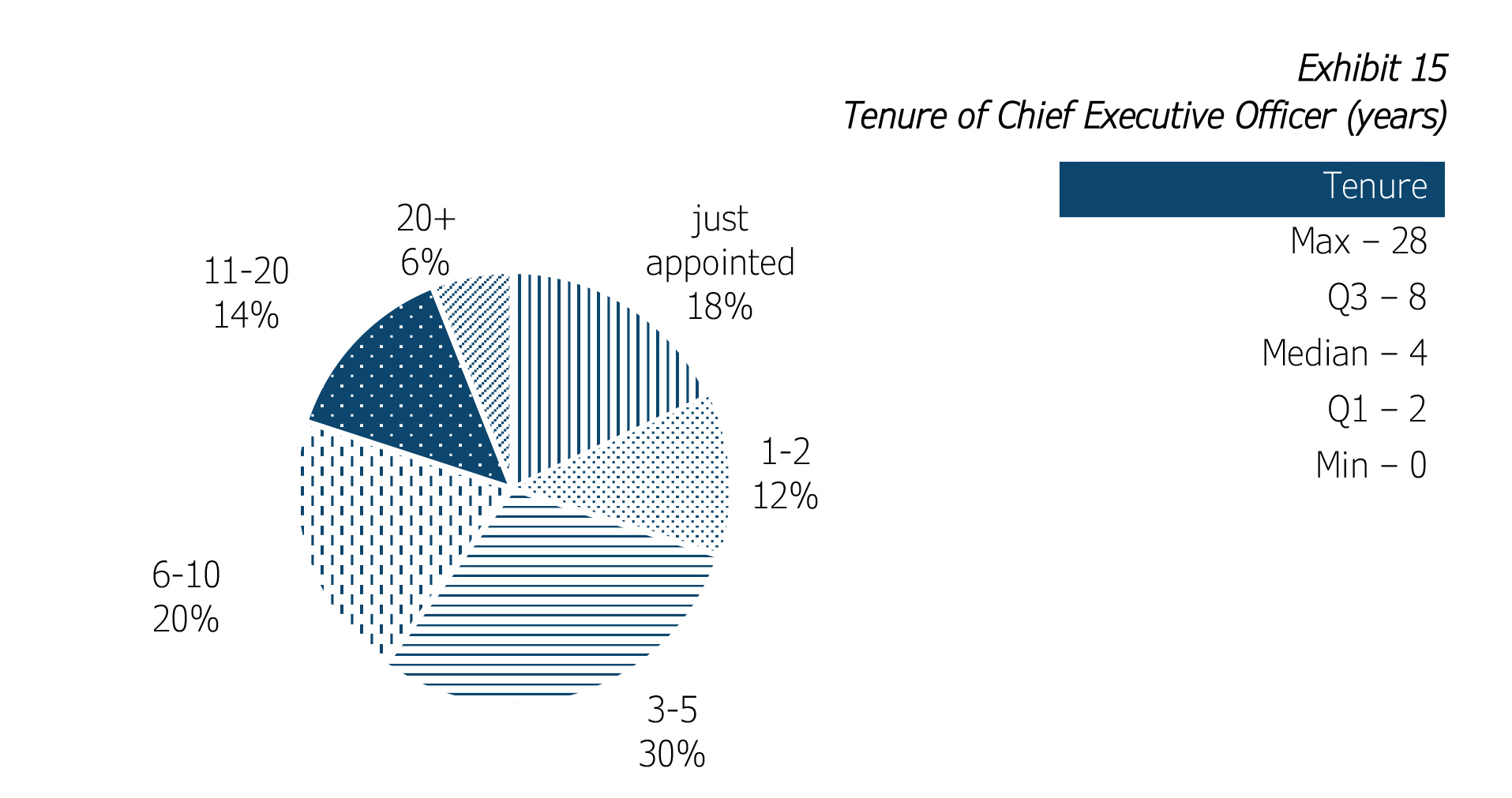
The average tenure is 6 years. 20% of the CEOs have held this position for more than 10 years. For hired CEOs, the average tenure is 4 years.
At one-tier boards, the Chief Executive Officer can be a member of the board of directors as well as Chairman of the board. At 95% of WHU-50 one-tier boards, the CEO is a member of the board of directors. In only 5% of cases the CEO is the Chairman of the board.
Besides the CEO, the Chief Financial Officer is often appointed as a member of the board of directors, and this is the case on 39% of WHU-50 one-tier boards. The Chief Operating Officer has been appointed to 18% of WHU-50 one-tier boards. The CEO is the only executive board member in 39% of WHU-50 one-tier companies.
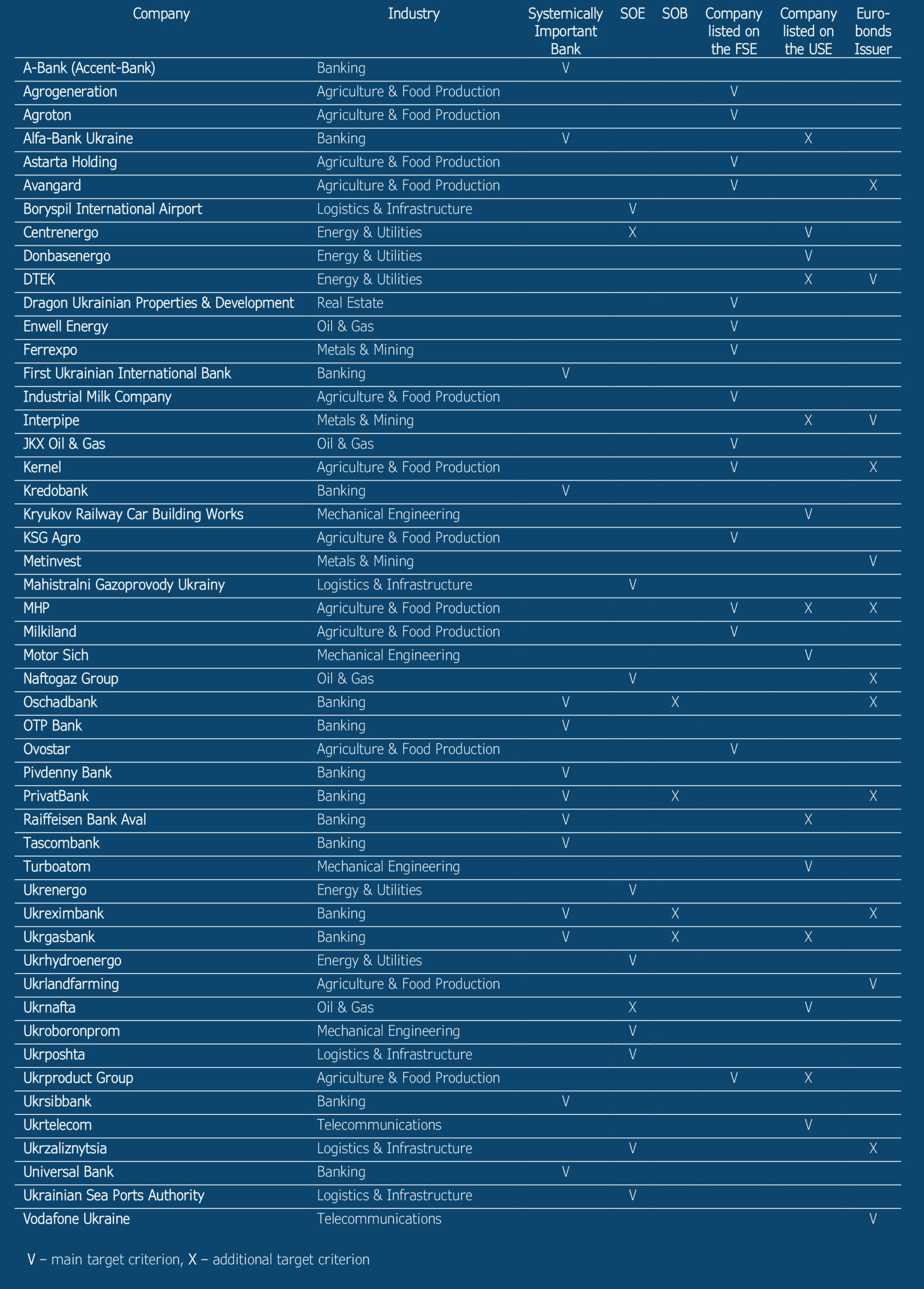
ABOUT US
Ward Howell
Ward Howell is one of the major global Executive Search and Leadership Development firms. We were founded in 1951 in New York City by the former head of McKinsey’s executive search practice, Henry Wardwell Howell, a pioneering management consultant who helped create the Executive Search profession. Today Ward Howell operates a network of 30 offices worldwide, is supported by over 130 partners, and is active in all major industry and services sectors.
Ward Howell Ukraine
Ward Howell opened its office in Kyiv in 2004 in order to support the rapidly growing demand for executive search services in Ukraine. Over the years we have built up an extensive network of personal contacts, especially among key executives and directors. We have also built within our firm an original research capability that rapidly and accurately identifies potential candidates at target companies specified jointly with our executive search clients. We serve a wide range of organizations in virtually every industry in Ukraine and the region. Our experience goes well beyond executive search to leadership development and board services. We help clients improve the effectiveness of their businesses through development and implementation of corporate governance systems, board effectiveness evaluation alongside acquisition, assessment, and development of board members.
Ward Howell Ukraine Leadership Institute
The Ward Howell Ukraine Leadership Institute is a proactive initiative to develop a knowledge-based approach towards research in Ukraine. The Institute was founded in 2019 to promote extensive research on corporate governance and leadership development. The Ward Howell Ukraine Leadership Institute conducts regular research on fundamental themes and developments as well as special research on newly developing topics of the day. The Institute also supports the data-driven approach to the conduct of executive search and consulting projects by Ward Howell Ukraine.
Authors
Igor Kabuzenko, Managing Partner Ukraine
Michael A. Tappan, International Partner
Diana Bondarenko, Senior Research Associate
Cover Image: © Coffeemill /Shutterstock
Editorial contact: i.kabuzenko@wardhowell.com.ua
Copyright © 2020 Ward Howell Ukraine. All rights reserved.
The information in this publication is not intended to be used as the basis for making any investment decision and must not be relied upon as any kind of investment, legal, financial, accounting, or other type of professional advice. The information contained in this material is believed to be reliable, but accuracy and completeness cannot be guaranteed. Direct copying or public distribution of this document, or its parts, is not allowed without the prior written permission of Ward Howell Ukraine. However, the information, conclusions, and graphs herein may be quoted and used with the reference to the original publication as: “Ukraine Corporate Governance Index by Ward Howell Ukraine Leadership Institute”.


